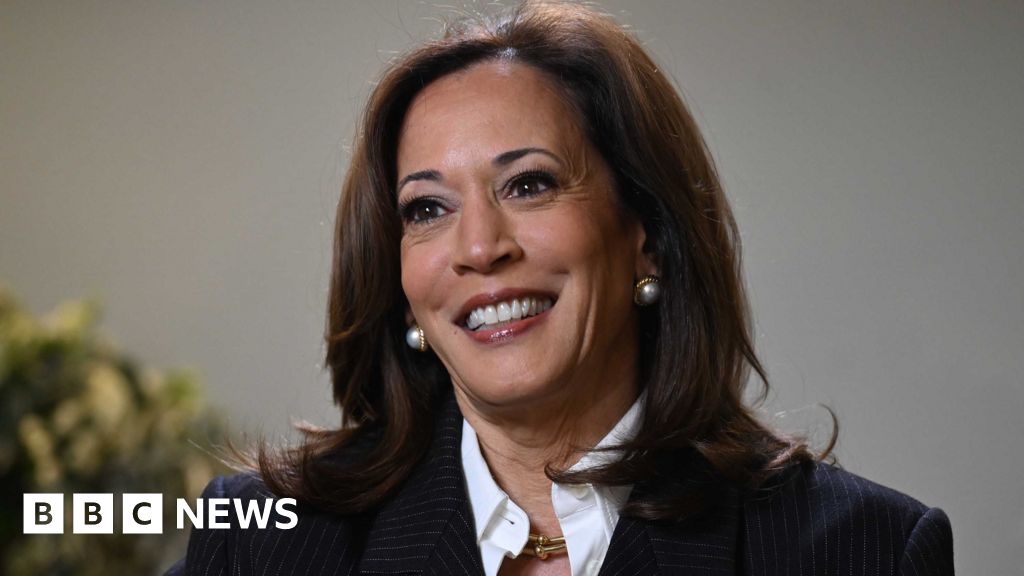Former US Vice-President Kamala Harris has indicated in a recent BBC interview that she may run for the presidency again in 2028, making her strongest public suggestion yet about seeking the White House after her loss in the previous election. Speaking from the UK in her first interview there since her vice-presidency, Harris expressed confidence that the United States will eventually see a woman president, possibly within the lifetime of her grandnieces. When asked directly if she might be that woman, she replied “possibly,” confirming she is seriously considering another presidential bid.
Harris’s remarks come amid ongoing reflection within the Democratic Party following Donald Trump’s unexpected victory in the last election. The party has been grappling with the reasons behind their defeat, with some criticism aimed at President Joe Biden for not stepping aside earlier, which might have allowed Harris more time to mount a stronger campaign. Questions have also been raised about whether Harris, who entered the race late after Biden’s withdrawal, could have run a better campaign or communicated a clearer message about key issues, particularly the economy.
In her BBC interview, Harris acknowledged that her late start in the presidential race made victory nearly impossible but remained resolute in her political aspirations. “I am not done,” she said, emphasizing her lifelong commitment to public service and her belief that she still has a future in politics. She dismissed polls that currently rank her as an outsider or place her behind celebrities like actor Dwayne “The Rock” Johnson for the Democratic nomination, saying she has never paid attention to polls and that they never deterred her from previous political pursuits.
Harris also did not shy away from harsh criticism of Donald Trump, whom she labeled a “tyrant.” She highlighted how many of her warnings on the campaign trail about Trump’s authoritarian tendencies have been validated. She cited examples such as Trump’s alleged weaponization of the Department of Justice and the suppression of political satire, referencing the suspension of late-night comedian Jimmy Kimmel after he made jokes about Republican reactions to the death of right-wing influencer Charlie Kirk. Harris criticized business leaders and institutions for what she sees as their willingness to “bend the knee” to Trump, motivated by a desire to maintain power or avoid regulatory scrutiny.
The White House responded dismissively to Harris’s comments, with spokeswoman Abigail Jackson accusing her of continuing to air grievances after a “landslide” defeat and suggesting that American voters were uninterested in her “absurd lies.”
Harris has recently published a memoir titled *107 Days*, recounting the brief but intense period she had to campaign for the presidency following Biden’s withdrawal. In the BBC interview, Harris was pressed on whether she should have urged Biden to step down sooner and whether she might be president now if he had. She acknowledged these questions as speculative and unanswerable but pointed to the narrow margin in the popular vote as evidence of how tight the race was, despite her heavy loss in the Electoral College.
The interview also touched on broader questions facing the Democratic Party as it tries to redefine itself in the face of Trump’s continued influence. Harris admitted that her campaign did not connect as well as she would have liked with working-class voters, an issue that has long challenged Democrats. She expressed regret that she did not have enough time in 2024 to fully develop her platform on critical economic issues such as housing and childcare. However, she stopped short of offering a definitive strategy for overcoming the party’s difficulties or for effectively countering Trump’s populist appeal.
Despite the bruising defeat and the challenges ahead, Harris’s demeanor suggested she remains ambitious and ready for another run. The former vice-president still operates with a large entourage and an intensely managed schedule, signaling that she remains a significant political figure on the national stage. While currently traveling for a book tour rather than a campaign, there is a sense that this could be the first step toward a future presidential bid.
The full interview with Kamala Harris will air on Sunday, October 26, 2025, on BBC’s *Sunday with Laura Kuenssberg*, providing a deeper insight into her reflections on the 2024 election, her political future, and the state of American democracy. As the Democratic Party continues to search for answers and prepare for upcoming elections, Harris’s evolving role will be closely watched by supporters and critics alike.

